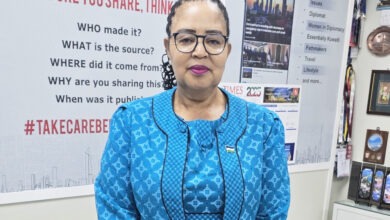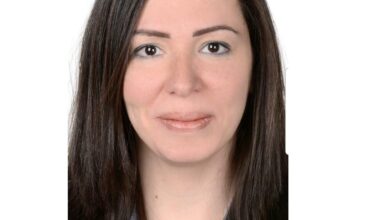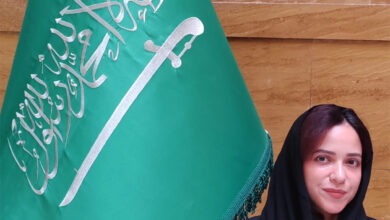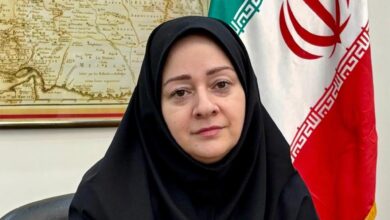Diplomatic positions come with huge responsibility

BY REAVEN D’SOUZA
MANAGING EDITOR
Anna Szenasi, First Secretary and Deputy Head of Mission of the Hungarian embassy in Kuwait, is a natural diplomat with excellent connections with the Arab world. Her infectious smile and charming personality go hand in hand with her hard work and consistent effort. Anna feels at home in Kuwait with the kindness she has received everywhere she goes. Always keen to fulfill the responsibilities shouldered on her, Anna shares her experiences with Managing Editor of The Times, Kuwait in an exclusive interview.
Can you please tell us a little bit about yourself; your background and what brought you to a career in diplomacy?
I have been working in the Ministry of Foreign Affairs and Trade of Hungary as a diplomat since 2007. I graduated from University Corvinus in Hungary, faculty of foreign and security policy and European Union studies. I also studied in Damascus, Syria at the Institute of Arab Language for Foreigners for two years.
My childhood experience determined my career path. I was nine years old when my father got an assignment in Damascus, Syria, so the whole family moved there for four years. My world opened up and I really enjoyed being in a different cultural environment. I continued my studies in an Arabic elementary school so I had the chance to socialize among local people, make many friends and at the same time witness the active, dynamic Embassy life. We also traveled a lot in the neighboring countries and saw the several thousand year old history of the Middle East. After returning to Hungary I continued my Arabic studies as a private student and was already planning to enter diplomacy one day.
Did you have a role model that encouraged your choice of career?
I have several role models throughout my career, both men and women. I really appreciate the support of my senior female and male colleagues who were always there for me and helped me to start my career, to gain the necessary knowledge and techniques of diplomacy, while standing beside me in difficult times and celebrating my successes with me.
I also have to mention my first female boss, Permanent Representative and Ambassador to the UN Katalin Bogyay with whom I was working in New York at the Permanent Mission to the UN. She has great experience in diplomacy, having led the Cultural Institute of Hungary in London; as the Ambassador to UNESCO in Paris, and then as the President of the General Assembly of UNESCO; and since 2015, as the Permanent Representative and Ambassador to the UN in New York, while also filling several important positions in the international organization. Her career path, open-minded approach and stamina encouraged me to go beyond my limits.
In the Hungarian Government three prominent ministries are led by women, I follow online the everyday work of the Minister of Justice, the Minister for Family and the Minister for the Management of National Assets. Their active contribution to the wellbeing of our society is really inspiring.
Where were some of your previous tenures, and any interesting episodes during your diplomatic career?
After spending five years at the Department of International Organizations in the Ministry of Foreign Affairs and Trade, the most interesting chapter of my career path was certainly in New York in 2015. At the Permanent Representation of Hungary to the UN, I had a wide range of portfolio, which included among others the famous UN Fifth Committee (financial issues), election officer, UN Security Council Reform and Protocol.
I was cast in deep water on the very first day so after one month basically I knew several hundred people and my network kept growing. The biggest challenge I faced was when I had to organize the one-week stay of the biggest Hungarian delegation ever to attend the UN high-level week on the occasion of the 70th anniversary of the United Nations.
Just one week after we hosted the Speaker of the Parliament who attended the IPU event, we were looking forward to accompanying the delegation of our President, Prime Minister and Foreign Minister. We just called it a “Grand Slam”. It was a work of 24/7, accompanying delegations by day and preparing the logistics for the next day by night. It was definitely a year to crown my experience in multilateral diplomacy.
What challenges did you face as a woman diplomat and how easy or difficult do you think it is for women to be able to work in the diplomatic field?
Since our pioneer fellow women diplomats paved the way for us over several decades, today in Hungary it is easier to be accepted as a woman diplomat than ever. More than half of the students at the faculty of international relations and diplomacy are women, and also we have an increasingly growing number of successful women diplomats in the Ministry of Foreign Affairs and Trade of Hungary.
As I am familiar with Arabic culture and I speak the language too I never had any difficulty doing my job in Arab countries. But at the same time, I do believe that mutual respect, being familiar with the history, the culture and the protocol of the host nation is essential for a diplomat when building professional relations.
Do you face any obstacles being a women diplomat in Kuwait, especially in attending the Kuwaiti Diwaniya circuit?
Since the first minute I arrived in Kuwait I have been treated with kindness, supported by the Kuwaiti authorities and by the colleagues I met in different institutions. I think my knowledge in Arabic language makes my professional relations with local people more special and close. Even during the strict COVID-19 measures I maintain the connection with them online. Since I was only invited to mixed Diwaniyas (social salons) I never faced any difficulty and I truly enjoyed meeting different actors of the Kuwaiti society. I hope we can resume these gatherings next year.
What do you enjoy most in your life as a diplomat?
I feel that a diplomatic position comes with a huge responsibility, but it also means being able to do useful things. Of course I enjoy getting to know different cultures and people, broadening my vision, but overall it is a very good feeling when you work for a win-win outcome and you see the results of your work — strong diplomatic and cultural ties, broad commercial cooperation between two countries. I am also very proud when I am introducing our beautiful culture, the more than a thousand year old Hungarian history, the inventions and the knowhow of our people in the field of sciences. I feel I am truly living a comprehensive and meaningful life while building bridges between people and countries.
Tell us about your experience in Kuwait so far?
Kuwait and Hungary have strong ties that date back to the 1970’s. We had direct flights between Kuwait and Budapest, for decades many Hungarians, mainly engineers and coaches were working here, and several important Hungarian companies all had their affiliates in Kuwait. We are also proud that a Hungarian invention helped Kuwait to extinguish oil fires after the Gulf War. Hungarian Orientalist and former Ambassador to Kuwait, Dr. Géza Fehérvári loved Kuwait and the history of the country, and after the end of his assignment he returned to Kuwait to be the curator of the Tareq Rajab Museum. With all this background I do feel the strong bond between the two nations which makes it easier to further develop our relations. I see that also Kuwaiti people are familiar with this connection.
I really like the atmosphere of the city, my social and professional life was very active before COVID-19, since then I try to maintain it online by attending webinars, conferences and meetings. Local people are very generous and helpful. I do admire the culture of charity, I attended several programs to raise funds for supporting people with disabilities and children in need. I also join charity activities online, for example I was helping to collect funds for Syrian refugees and the victims of the Beirut explosion.
I was posted to Kuwait in January 2019, and my first year was very busy. I truly enjoyed building my professional network, attending exhibitions, conferences, meetings, receptions and Diwaniyas. As the diplomat responsible for cultural affairs at our Embassy I had the chance to bring the most famous Hungarian folk dance group, the Hungarian National Dance Ensemble in October 2019 to celebrate our national day in Kuwait. We had a full house for two nights in Abdulhussein Abdulredha Theater and since then wherever I go people ask me if we can bring the Ensemble again as it was a truly memorable event.
Where do you see yourself in the coming years in your career?
I believe in finding the right goals and putting the effort to reach them. A higher position can be useful as it allows you more space to connect with important counterparts and reach your aims more effectively, but for me it is also important to be able to do the job I really like, which I can be devoted and passionate about, to work for the benefit of my country and to make a positive impact on people’s life in general.
How do you see Kuwaiti women’s role in society?
Since the first day of my arrival to Kuwait I was attending events where I had the chance to meet Kuwaiti women working for the wellbeing of their society. The first event I attended was the Women’s Cultural and Social Society meeting in March 2019 which made a huge impact on me. I do admire the role women play in supporting each other, giving a better future for their children and youth, supporting people with disabilities and protecting the environment.
Since women’s suffrage was introduced in 2005, Kuwaiti women have gained a greater role in leadership positions, they participate in politics, work as judges, and reach great results in science and technology. A very unique experience in the Arab world. Kuwaiti women have a strong role in the family but at the same time they access education and employment equally. I was surprised when I heard that the Faculty of IT at Kuwait University is mainly attended by women students, because in Europe mostly men choose this profession.
What are your hobbies / how do you spend your free time?
If there is no COVID-19, I have a very active social life, I meet my diplomat colleagues, members of the international community and also have some Hungarian friends. Beside charity activities I was one of the founders of the Kuwait Women Diplomats Association started by American diplomats last year, which also gives good opportunity to meet Kuwaiti and foreign colleagues in an informal environment.
Sport is basic since childhood in my life, I do exercise on a daily basis, jogging, zumba, body combat, yoga. I like painting, I met a Kuwaiti artist and she is teaching me different techniques. Besides, I also follow an ancient Hungarian national tradition and I do horse riding wherever I live.
Any experience you would like to share with us?
People usually think that the work of a diplomat is only about attending meetings and receptions. But of course it is much more than that. For example working in the position of the Deputy Head of Mission at a small Embassy is a multitasking job with challenges.
You have to be confident and well prepared at high level meetings and negotiations, to produce accurate and substantial political analysis, to be up to date in consular work and beside all these you are responsible for the HR, security, administration and technical issues of the Embassy. Just like managing a small company, it needs a modern and multifaceted approach.
I am glad that both my Ambassador and the Ministry of Foreign Affairs and Trade are satisfied with the job I am doing. Being in this position is a very good opportunity to broaden my knowledge in practice and also a good proof that women are able to cope with such tasks just like men. I encourage women to take on these kinds of challenges, because beside our own success we can truly add value to our families and societies.
















